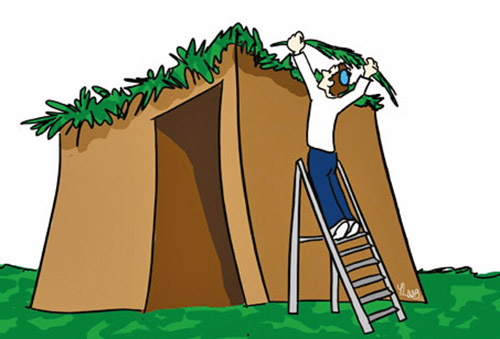
There are many rules for the building of a sukkah but there are very few for dismantling a sukkah and even fewer for storing it. Similarly, on Chanukah there are plenty of rules about lighting the Menorah but few, if any, regarding post-holiday Menorah storage. On Pesach, there are ample rules governing the Seder but few, if any, for Seder plate storage. Thus, in certain situations, Jewish law has plenty to say about the build-up but far less about the take-down and put-away.
The lack of storage-related instructions for the sukkah is somewhat strange given other customs and practices. For example, every Shabbos we take the Torah out of the Aron Kodesh and, after the Torah-reading portion of davening, we return the Torah to the ark for safe-keeping. Clearly, we know how to store items of importance. Of course, Torah storage is far more important than sukkah storage just like a fleishig kiddush is far more important than a milchig kiddush. One could argue that comparing Torah storage to sukkah storage is even loonier than comparing (i) playoff sports to pre-season sports, (ii) a professionally-trained chazzan to an amateur crooner with laryngitis or (iii) a full-fledged Purim seudah to a half-hearted shaleshudes. Some things simply cannot be compared.
We nevertheless must acknowledge the disparity between the rules for sukkah construction and storage. Jewish law is replete with sukkah-building rules that are highly-detailed and extremely strict. They address, with almost O.C.D.-level precision, a sukkah’s length, height, walls, roof, location, materials and usage. The rules also explain when and how a sukkah may be secured during inclement weather (but they do not address sukkah-building during an outer space invasion) and whether it is permissible to use a stolen sukkah (but they do not address whether a sukkah may be subject to annexation or commandeering.) The sukkah rules also discuss when a sukkah may be disassembled but they do not specify, at least not in the same painstaking detail, how such disassembly must be performed. The rules also do not specify where a sukkah may be stored before and after sukkot. It therefore appears that, for off-season purposes, the storing of a sukkah is as unregulated as the private making of etrog jelly.
For sukkah storage, one needs sufficient space that, ideally, is not in a prime location. For this reason, you often will find a sukkah stored in a garage, attic or basement. Some folks build special sheds for storing a sukkah but possibly lost on them is the irony of building a permanent structure to store a temporary one.
It is fair to note that most Judaica items are not normally stored in a shed. A sukkah, however, often is found in a shed, just like bagels often are found at a bris, a line often is found at carpool pick-up and boredom often is found at a shul dinner.
Some people avoid the hassle of sukkah ownership and its attendant burdens by simply renting a sukkah. There is nothing wrong with renting a sukkah just like there is nothing wrong with renting a car, an apartment or a tuxedo. Other things in life, however, should not be rented. For example, you probably should not rent items that you put in your mouth like toothbrushes and toothpicks.
In the Jewish world, the concept of renting can apply to things other than a sukkah. In fact, there might be instances in which renting a person is appropriate. For example, it probably is perfectly fine to rent a rabbi, chazzan, mohel or mashgiach. That said, one probably should not rent a shabbos guest, best friend or bashert. Doing so would reek of desperation and likely send an unfortunate message that your relationships are artificial and contrived. On the flip side, it might be fine for a person to rent an enemy, a critic or a nudnik, but who would do such a thing? Perhaps a sadomasochist or drama queen, though intentionally renting something that will make your life worse would be as silly as (i) planning an outdoor, beach-themed wedding in the winter, (ii) forcing a Sephardic minyan to merge with an Ashkenazic minyan and calling it the “Ashkephardic” minyan or (iii) making semi-aliyah by moving to Jerusalem, Alabama.
Final thought: Did you hear about the sukkah-building Jew who was indicted because he built a temporary structure? Rather than go to trial, he pleaded “temporary” insanity.
Send comments or insults to [email protected].
By Jonathan Kranz










